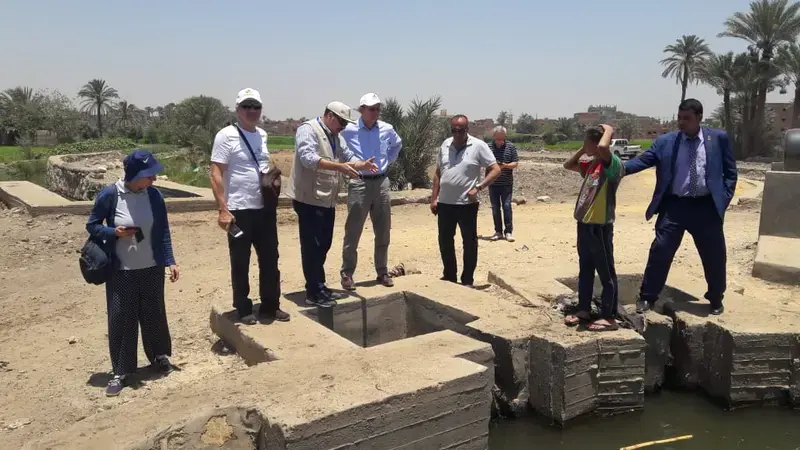CGIAR visit to ICARDA’s Enhancing water productivity by improving on-farm irrigation management

Fayoum - Egypt, June 25th – The productivity and sustainability of water use in Egypt’s agricultural sector, both at present and in the future, depends on the efficient use of water at both the farm and basin levels.
For the CGIAR it is therefore vital to understand how one of its centers addresses this daunting challenge - and more generally how agricultural research improves the livelihoods of the end-beneficiaries it claims to serve.
The CGIAR System Organization delegated Andrew Smith, Deputy Director, Board and Council Relations, to observe the progress of a project managed by the International Center for Agricultural Research in the Dry Areas (ICARDA) in Egypt ‘Enhancing water productivity by improving on-farm irrigation management in Fayoum.’
Water User Associations (WUAs) in Minya and Fayoum, Egypt’s Agricultural Engineering Research Institute, the Agricultural Research Center, the EU Joint Rural Development Programme, and ICARDA, collaborate closely to build the capacity of growers, water planners and decision makers to improve sustainable water productivity in its all dimensions (social, economic, and biophysical). Together they facilitate the dissemination of appropriate irrigation techniques and practices. But, this project is also essentially a community-based project which is implemented in a participatory approach to ensure long-term sustainability after the project concludes.
To promote ownership by local stakeholders, Andrew Smith focused attention on the importance of local training, capacity building and extension networks, and on-farm irrigation innovations.
Smith also enquired about the amount of money invested in the project, , and was told that the EU Joint Rural Development Programme had invested €22 million in Matrouh, Minya and Fayoum, including an earmarked budget of €6.5 million in Fayoum.
The Al Fayoum governor, H.E. Sherif Habib, praised the activities of the project for helping to mitigate current and future conflicts related to water use. He expressed his deep gratitude to ICARDA and its collaborators for introducing rural communities to their research outputs and providing support to enhance their livelihoods.
Farmers experienced the following benefits: saving seeds, increasing yields, reducing farming costs and yields, and increasing farm use (cultivation of the whole plot). The local WUA was able to demonstrate how the replacement of the earthen canals by cemented lined canals allowed for better water distribution and a better discharge of water downstream.
The visit provided first-hand knowledge and understanding associated with the on-farm adoption of new and improved practices and changes in targeted communities. The delegates gained an in-depth understanding of what it takes to improve on-farm irrigation management and how farmers make adoption decisions. The involvement of all partners and stakeholders in the visit allowed for rich discussions on how to develop continuous linkages and feedback between science and its application at the field level.
The project assists water policy planners and managers to improve water delivery through better information on water demand, and it helps farmers to improve on-farm irrigation efficiency by providing crop water use information and the necessary skills, tools, and capacities to undertake this work.
Further references:
Power point presentation by Atef Swelam: Improve on-farm irrigation management
Further contact:
Atef Swelam, Senior Scientist-Irrigation Water Management, ICARDA [email protected]




